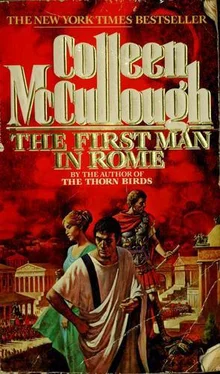Colleen McCullough - 1. First Man in Rome
Здесь есть возможность читать онлайн «Colleen McCullough - 1. First Man in Rome» весь текст электронной книги совершенно бесплатно (целиком полную версию без сокращений). В некоторых случаях можно слушать аудио, скачать через торрент в формате fb2 и присутствует краткое содержание. Жанр: Современная проза. Описание произведения, (предисловие) а так же отзывы посетителей доступны на портале библиотеки ЛибКат.
- Название:1. First Man in Rome
- Автор:
- Жанр:
- Год:неизвестен
- ISBN:нет данных
- Рейтинг книги:3 / 5. Голосов: 1
-
Избранное:Добавить в избранное
- Отзывы:
-
Ваша оценка:
- 60
- 1
- 2
- 3
- 4
- 5
1. First Man in Rome: краткое содержание, описание и аннотация
Предлагаем к чтению аннотацию, описание, краткое содержание или предисловие (зависит от того, что написал сам автор книги «1. First Man in Rome»). Если вы не нашли необходимую информацию о книге — напишите в комментариях, мы постараемся отыскать её.
1. First Man in Rome — читать онлайн бесплатно полную книгу (весь текст) целиком
Ниже представлен текст книги, разбитый по страницам. Система сохранения места последней прочитанной страницы, позволяет с удобством читать онлайн бесплатно книгу «1. First Man in Rome», без необходимости каждый раз заново искать на чём Вы остановились. Поставьте закладку, и сможете в любой момент перейти на страницу, на которой закончили чтение.
Интервал:
Закладка:
1
Somewhere among them too was Gaius Marius. As an ex-praetor, he wore the purple-bordered toga praetexta, and on his dark red senatorial shoes he wore the crescent-shaped buckle his praetorship permitted. Yet it wasn't enough. He had been a praetor five years earlier, should have been consul three years ago. But he knew now that he would never be allowed to run for the consulship. Never. Why? Because he wasn't good enough. That was the only reason why. Who had ever heard of a family called Marius? No one.
Gaius Marius was an upstart from the rural nowhere, a Military Man, someone who was said to have no Greek, and who still could be trapped by excitement or anger into putting upcountry inflections on his native Latin. It didn't matter that he could buy and sell half the Senate; it didn't matter that on a battlefield he could outgeneral both halves of the Senate. What did matter was blood. And his just wasn't good enough. Gaius Marius hailed from Arpinum not so many miles away from Rome really, but dangerously close to the border between Latium and Samnium, and therefore a trifle suspect in its loyalties and leanings; the Samnites were still Rome's most obdurate enemies among the Italians. Full Roman citizenship had come late to Arpinum only seventy-eight years ago and the district still did not enjoy proper municipal status. Ah, but it was so beautiful! Huddled in the foothills of the high Apennines, a fruitful valley cupping both the Liris and the Melfa rivers, where the grape grew with wonderful results for table as well as vintage, where the crops returned a hundred-and-fifty-fold, and the sheep were fat and the wool surprisingly fine. Peaceful. Green. Sleepy. Cooler than expected in summer, warmer than expected in winter. The water in both rivers was full of fish; the dense forests on the mountains ringing Arpinum's bowl around still yielded superb timber for ships and buildings. And there were pitch pines and torch pines, oaks to litter the ground with acorns for the pigs in autumn, fat hams and sausages and bacon fit to grace any noble table in Rome which they often did. Gaius Marius's family had been in Arpinum for centuries, prided itself upon its Latinity. Was Marius a Volscian name, a Samnite name? Did it have an Oscan ring to it, just because there were Samnites and Volsci called Marius? No! Marius was Latin. He, Gaius Marius, was as good as any of those lofty-nosed, haughty nobles who so delighted in putting him down. In fact and this was what really hurt! he was much better than any of them. His feeling told him so. How could a man explain away a feeling? A feeling he hosted like a guest who refused to leave, no matter how inhospitably he behaved? It was a long, long time since that feeling had first moved inside his mind, time enough and more for the events of the ensuing years to have shown it its futility, prod it into moving out in despair. Yet it never had. It lived inside his mind today as vividly and indomitably as it had in the beginning, fully half a lifetime ago.
Читать дальшеИнтервал:
Закладка:
Похожие книги на «1. First Man in Rome»
Представляем Вашему вниманию похожие книги на «1. First Man in Rome» списком для выбора. Мы отобрали схожую по названию и смыслу литературу в надежде предоставить читателям больше вариантов отыскать новые, интересные, ещё непрочитанные произведения.
Обсуждение, отзывы о книге «1. First Man in Rome» и просто собственные мнения читателей. Оставьте ваши комментарии, напишите, что Вы думаете о произведении, его смысле или главных героях. Укажите что конкретно понравилось, а что нет, и почему Вы так считаете.












